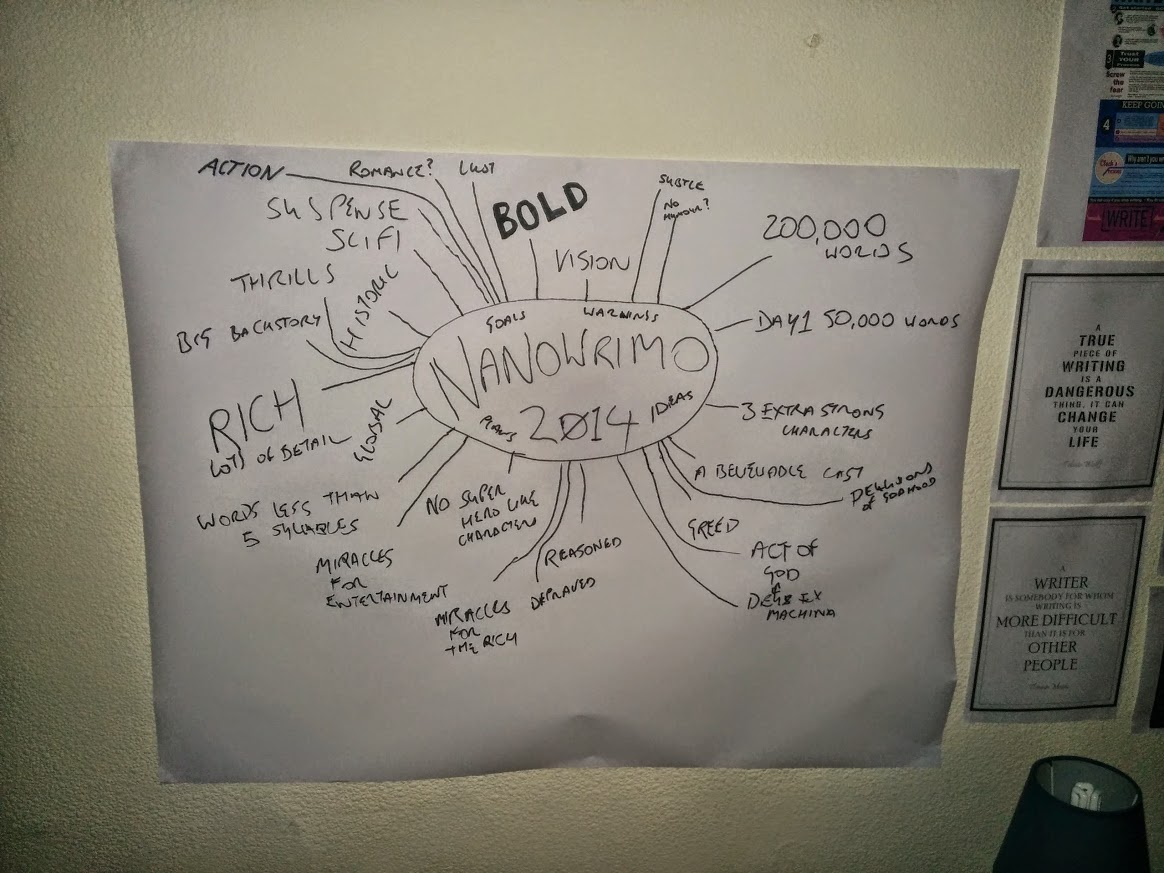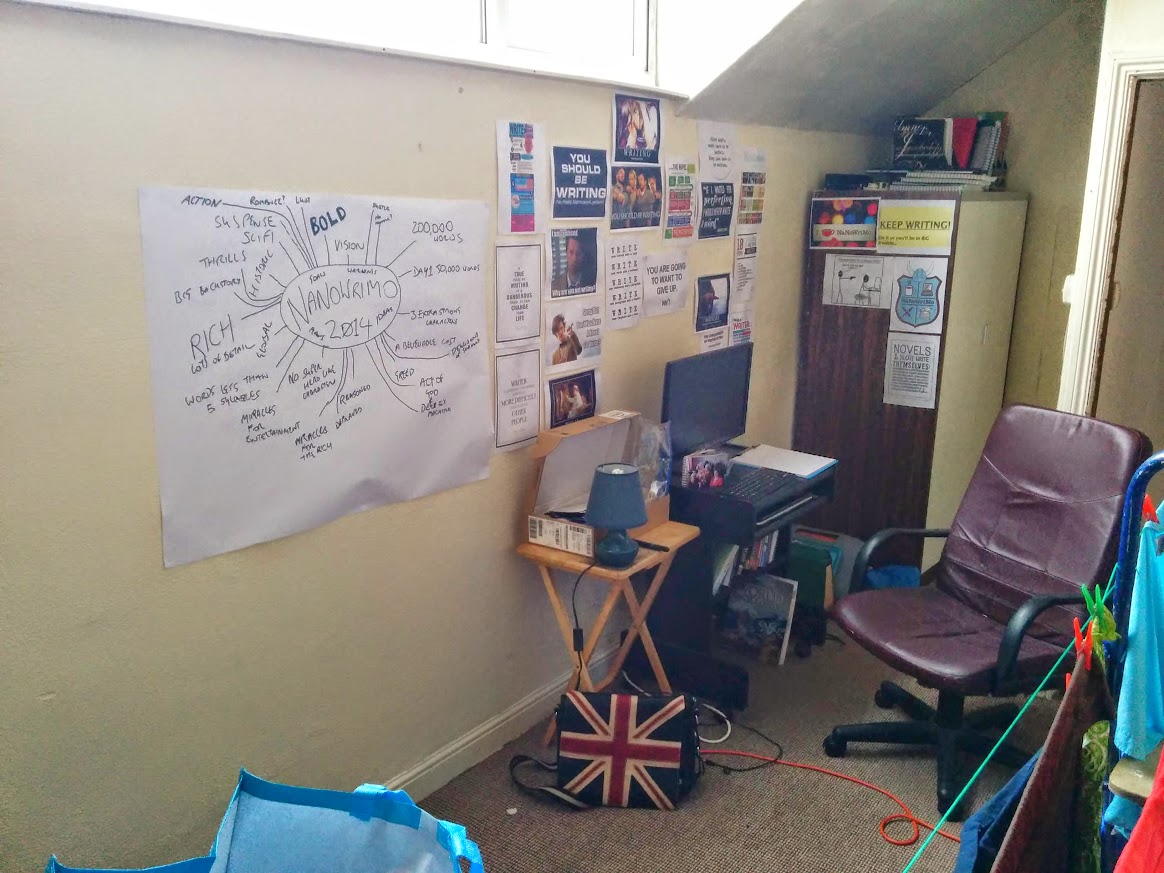Before I go into what NaNoWriMo has done for me, and my five reasons I think everyone should try it, here’s a reminder of what NaNoWriMo is:
What is NaNoWriMo (well my interpretation anyway)
NaNoWriMo is the challenge to write a 50,000 word novel in the month of November. That’s as simple as it gets. It happens every year, and has been going on for fifteen years. It has a fabulous community, and great meet ups, (or at least I can confidently say it does from first-hand experience here in Leeds, UK). 
Anyone who reaches 50,000 words is declared a winner, but you don’t need to give your novel to anyone, no has to read it – if you want an official win, you put it into software on the website that simply counts words and then forgets all but the number of words you wrote. It doesn’t have to be a master piece, you’re only aiming for a first draft after all*. The story doesn’t even need to be finished, you could hit 50,000 words, and realise you’re only half way through, and that’s fine.
The most important thing to remember about those 50,000 words, or more, or less, don’t edit. Don’t worry about what’s gone wrong three pages back, write around it, and ignore it. If you spot red squiggly lines, ignore them, move in. Spell checkers work just as well at the end of your novel, as they do if you run it each and every page. By not editing, worrying about spelling and grammar, you can focus on just writing. Get the first draft onto the page, and you can polish it up to a glorious shine after November.
In truth, no one need ever know you’re doing it. You could do it in private, your time a mysterious secret to your friends and family. You could just join the forums online, and never meet a person in the real world while you’re doing NaNoWriMo. Or you can go beyond the weekly meets, spend every night and day you can in the coffee shop as other Wrimos**, coming and going trying to do the same thing. You control how much or how little you get involved.
As to how you write, well you can do that on your computer, your tablet, your phone, or you can go old school and do it in a notebook using a pen, (though if your handwriting is as bad as mine, good luck). I suppose if you really wanted to go old school, you could get out the stone tablets and start chiselling away, (though I’m not convinced you could do 50,000 legible words in 30 days in stone, anyone want to prove me wrong?).
The choice is yours. In fact, that’s pretty much NaNoWriMo in a nutshell. You can choose what to write, where to write, when to write, (well within the month of November), what support you want, who to write with.
If you want to sign up, go to nanowrimo.org – check out some of the resources for getting started, there’s a lot of good information that can be of great value to newcomers and old timers. I do like a lot of the pep talks, (which can be found archived here: http://nanowrimo.org/pep-talks, my particular favourite being Piers Anthony’s in 2008, as not only is he one of my favourite authors, it was thoroughly entertaining and inspiring).
* draft; a first or preliminary form of any writing, subject to revision, copying, etc. (I’m not being patronising, I just really want to emphasise you’re not writing a finished piece, it doesn’t matter if freind was spelt wrong, move on and you’ll pick it up in editing).
** Wrimos; a participant of NaNoWriMo, or NaNoWriMo like challenge
Me and NaNoWriMo
The most common theme throughout my blog for the past 6 years has been NaNoWriMo. It’s as important a marker in my year as my own birthday, maybe even more.
It’s changed my life in so many ways, and it’s also helped me to keep something important within me alive. I don’t have a crystal ball, I can’t say for certain that by now I would have stopped writing, I think that’s a distinct possibility if I’m honest, (poetry has long since stopped being a facet of my creative life), but I do know for certain it’s changed how I’ve approached writing, and the lessons I’ve learnt don’t stop at writing.
What I’ve also got is three successful attempts at NaNoWriMo, and two rich lessons, (okay two years I failed to complete 50,000 words – I prefer to think of what I gained in my lack of success). With each of those attempts I’ve two stories to enjoy, the story of having tried, and the story that directly resulted from trying.
I’ve met some really fantastic people over the past six years, who’ve helped me a lot in writing, (hopefully I might have helped them on occasion too).
It’s incredibly exciting, you live life to deadlines, you have to rush to catch-up, or you’ll get lost in the middle of your novel and have to make the heart wrenching choice to abandon a story and switch to a new one so you can accomplish your goals. (I don’t recommend that by the way, but at some point it happens to us all – we just can’t take a story further without a lot of work, or starting it again, and you don’t go backwards in NaNoWriMo, you go forwards).
In fact, going forwards is one of the things I’ve learnt the most from NaNoWriMo, it’s given me a bit of ambition, a lesson in goal setting, rather than settling.
Finally, the five reasons to do NaNoWriMo
As a result of all the above, I honestly do believe if you’ve any interest in writing a story, from a short story to an epic novel, that you should give NaNoWriMo a try. So here are the five reasons I think you should give NaNoWriMo a try:
- The most basic one of all, because you have an idea. Story telling is everywhere, television, the internet, the radio, it’s in your newspapers, and your magazines. Storytelling is a part of all our lives, so I’m willing to bet at some point in your life, you’ve had what you felt was a great idea. What’s the worst that could happen? If you don’t like your first draft, you can file it away for another twenty years, and if you do like it, you can enjoy it being realised, and you never know, you might make your fotune with it***.
- You love books. You’ve been taking and taking for years, feasting on the latest J. K. Rowling, Katie Oliver, or Robin Hobb, maybe now’s the time to have a go at giving something back, to adding to the pantheon of storytellers? I don’t care what anyone says, if you write, you’re a writer, and that’s an accolade you can keep.
- To be part of a community that stretches from right where you live to all the way around the globe. The local communities are amazing, and the global community will blow your mind. The regional wordcount boards have a peculiar focus each year – we here in Yorkshire, in line with our Olympic successes, like to sit with pride higher than whole countries. Everyone’s there trying to help each other, trying to outdo each other, supporting and cajoling just when you need it. You’ll meet new friends, try new things. You’ll part of one of those mysterious groups that take over whole areas of coffee shops, laptops and notepads dotted around, people calling out the latest challenge.
- Whether you end up writing 500 words, 5,000 words, 50,000 words, or 150,000 words – it’s all good. Yes the challenge is to hit 50,000 words, but if you don’t it’s still great. If you only did 5,000 words, that’s more words than you had at the start of the month. Its 5,000 words closer to the story you always wanted to write. So no matter what, you can win.
- To have fun. If you enjoy writing, enjoy it. There’s tremendous joy in building something new, it’s exciting, and thrilling… and in the world of the consumer it might even feel rare and precious to you.
I could go on, but I set out to just do five reasons, and I think that’s accomplished. NaNoWriMo, whatever your aiming for, is a defined time to do it, it’s a supportive community, it’s the opportunity to make something, to leave behind the what ifs, and say “I am”.
Unofficial reason number 6, every year they have new fun images to celebrate participation and success, and they’re a different theme every year. My favourites were the Venn diagrams, (what can I say, I do charts and graphs for a living), but last year’s 8 bit designs were a lot of fun.
*** I wish I could promise you a fortune, but sadly most novels won’t make it – but I can’t stress this enough, if you don’t try, you won’t know.





















 Which is really thrilling.
Which is really thrilling.

